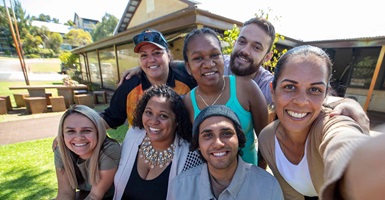The residents of the Japanese region of Okinawa are among the longest-living inhabitants on the planet. This island group in the East China Sea has the highest concentration of centenarians in the world – and it’s not just down to their incredibly healthy diet.
Okinawa is the birthplace of a concept called “ikigai” (pronounced eek-ee-guy) – which, at its heart, means a reason for being.
“It’s about finding the purpose to the life you are living and being true to your values,” says Natalie Smith, Senior Counsellor in Student Services at Chisholm. “If we are being driven by what we value and what is important to us, then … we draw energy from that passion, helping us align with our core values and ultimately helping us find a sense of belonging and a sense of peace.”
She believes that we become empowered when we find meaning in our lives: “Having an empowered self has a positive ripple effect on our body, mind and spirit that can keep us in good health and harmony. Feeling empowered will also help us to better overcome challenges and see opportunities that come our way.”
Ikigai is the intersection of four things: what you’re good at (your vocation), what you love (passion), what the world needs (mission) and what you can be paid for (profession). It can relate as much to what you do in terms of your profession (i.e. doing something you truly believe in) as it can to what you do in your spare time (volunteering for a cause you feel passionate about), or when you’ve retired from work. No matter what stage of life you’re in – finding your passion is a key to fulfilment, according to the precepts of ikigai.
But how exactly do you find what you’re passionate about? “That is a big life question,” says Natalie. “One way is to really think about what your strengths are and then follow them. Also remind yourself about what you love while being open to new interests.
“In life and in learning, a big clue is to recognise what comes naturally and trust your skill when going about your self-discovery.”
In The Little Book of Ikigai, Japanese neuroscientist Ken Mogi outlines five key pillars of the concept. These include starting small (realising that finding your reason for being might not happen overnight), releasing yourself (being less concerned about how we appear to others and more focused on our work), the joy of little things (how small acts or experiences make us joyful) and being in the here and now (if we’re in the present moment, we can value what’s in front of us).
All well and good, but how do we possibly find time to discover our purpose in the midst of our overloaded lives, particularly if we’re studying or, harder still, studying and working.
“Naturally, everyone is experiencing different pressures and different levels of study but in order to achieve a study goal, it is important to take breaks and do something enjoyable so you can return with fresh energy,” Natalie says. “It’s good to rest from study and recharge by drawing energy from a passion – it can help to maintain balance and motivation.”


